In the realm of health and fitness, few topics have gained as much attention lately as gut health, and for good reason! The state of our gut is incredibly important and often overlooked. Sometimes referred to as our second brain, it plays a pivotal role in our overall well-being from digestion and immune support to things like mood regulation and sleep. Our gut is not simply a pathway for the food we eat — it’s a complex ecosystem that affects our entire well-being.
In the upcoming sections, I’ll walk you through a curated selection of foods known for their gut-enhancing properties. Each section will detail the food’s specific prebiotic or probiotic characteristics and practical advice on how to incorporate them into your regular meals.
So what is the gut?
Sort of a strange word, but the gut is just a term used to refer to the community of microorganisms residing in our intestines that work around the clock to support digestion, bolster our immune system, and even influence our mental state. Imbalances in the gut can lead to a range of issues, from general discomfort to chronic health conditions.
Incorporating foods that improve gut health isn’t just good for your stomach, it’s a decision that benefits your overall health. Understanding what foods promote a vibrant, flourishing gut is our focus here because a happy gut means a happy you.
Foundations of Gut Health: Prebiotics vs. Probiotics
You’ve maybe heard the terms prebiotics and probiotics, but do you know the difference? They work in tandem and a basic understanding is really helpful for stimulating gut health.
Prebiotics are dietary fibers that our bodies cannot digest. Think of these fibers as the food for probiotics, which are the live, beneficial bacteria and yeasts that reside in your gut. By including them in your diet, you’re providing them fuel to help them function.
Probiotics on the other hand are the heroes of your gastrointestinal tract. They’re like a local neighborhood watch, keeping the peace by making sure harmful microorganisms don’t settle in and cause trouble while letting the good one’s remain.
Together, these two elements create a synergetic effect for digestive wellness. By consuming foods rich in prebiotics, you’re laying out a welcome mat for probiotics. The outcome? A more balanced, efficient gut microbiome.
Maintaining this balance is key, so keep reading to compile your list of some incredible prebiotic and probiotic foods that you can start eating to improve your gut health.
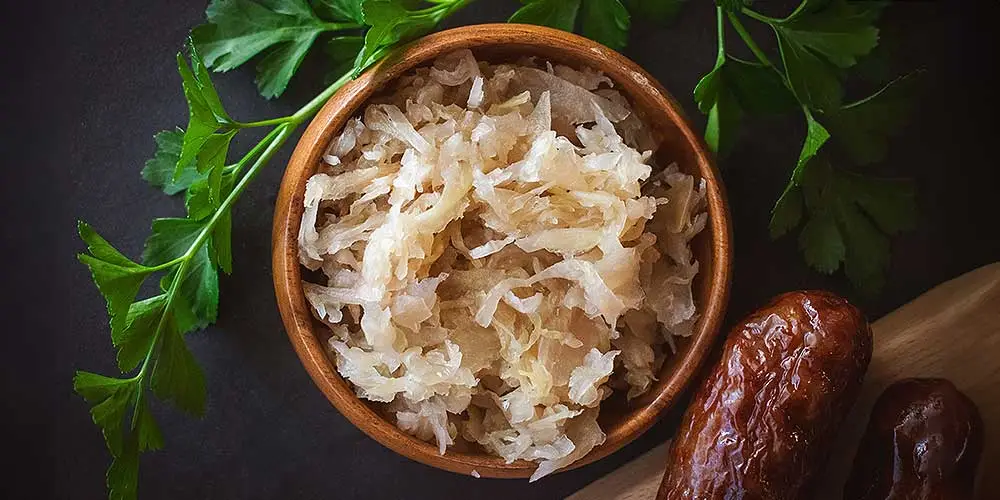
Sauerkraut: A Tangy Treat for Your Gut Microbiome
Sauerkraut is more than just a delicious condiment. It’s a fermented food that’s positively brimming with benefits that your gut absolutely loves. Now, why does this matter to your gut health? Fermentation. It’s a process that uses natural bacteria to preserve and enhance foods, and also creates beneficial enzymes, B vitamins, Omega-3 fatty acids, and various strains of probiotics.
Nutritionally, sauerkraut is low in calories but high in fiber, vitamin C and K, and has a good amount of potassium. More importantly, for your gut, it’s the probiotics that take center stage. These friendly bacteria will assist in digesting your food better and also help maintain a strong barrier against bad bacteria and viruses.
You can add sauerkraut to your meals in many ways — top off a salad, add to a sandwich, or simply enjoy it as a side. Remember, heat kills probiotics, so it’s best to add sauerkraut after the cooking process if you’re aiming for the maximum gut health benefit.
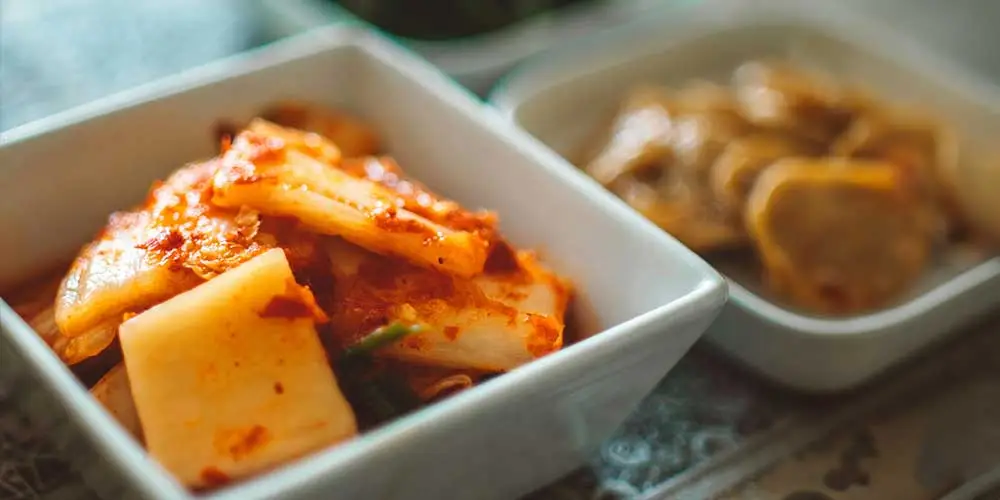
Kimchi: The Spicy Sidekick to a Healthy Gut
Diversity is key for a thriving gut microbiome, and kimchi brings just that with its spicy, tangy flavor. This traditional Korean dish, usually made from fermented cabbage and radishes, has gained international popularity not just for its ability to spice up a meal, but also for its probiotic power.
Like sauerkraut, the fermentation process kimchi undergoes makes it rich in lactobacilli, a beneficial bacteria that’s a hero for your gut health. This helps with digestion and can even ward off harmful bacteria, thereby protecting your gut. Furthermore, kimchi is packed with vitamins A and C, along with crucial minerals.
Even if you’re new to fermented foods, incorporating kimchi into your diet is straightforward. It’s a dynamic addition to rice dishes, can enhance the flavor profile of scrambled eggs, or simply served as a side to add a spicy probiotic punch to your meal.
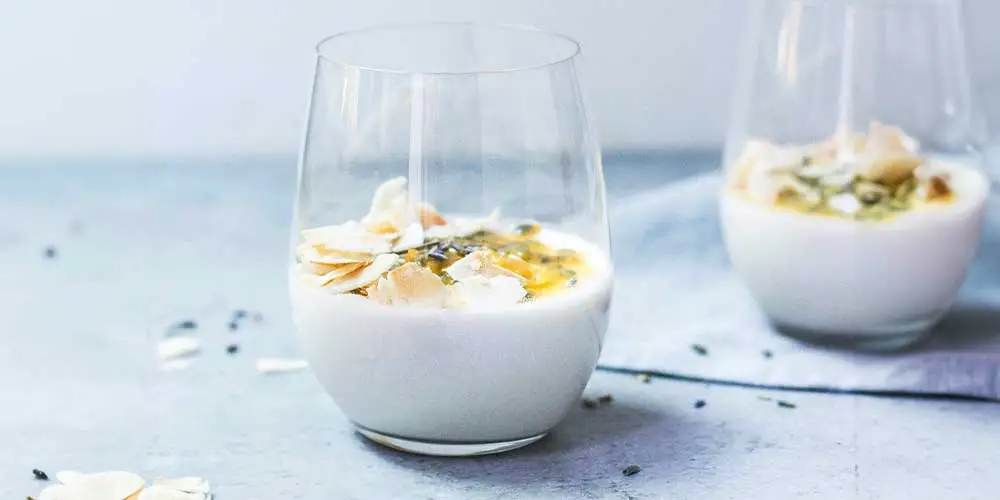
Kefir: Sip Your Way to Gut Harmony
This fermented dairy drink (sort of like a liquid yogurt) is full of probiotics that could do wonders for your gut. Kefir grains, the starting point for this tangy beverage, are a complex mix of bacteria and yeast. These microorganisms kick-start the fermentation that not only gives kefir its unique tart flavor but also transforms it into a probiotic powerhouse.
When compared to yogurt, kefir often contains a greater diversity of probiotic strains. And if the idea of ingesting bacteria strains makes you think twice, consider this: the probiotics in kefir assist with digestion, alleviate symptoms of irritable bowl syndrome (IBS) and can help bolster your immune system. By incorporating a daily glass of kefir into your diet, you could not only keep your digestive tract happy but also provide a boost to your body’s defenses.
Kombucha: A Fermented Fizzy Friend
Kombucha. That’s a fun word. So what is it exactly? Kombucha is a fermented tea drink known for its sharp, often sweet, tangy taste. Made by adding specific strains of bacteria, yeast, and sugar to black or green tea and allowing it to ferment, it comes in a wide range of flavors.
The real magic of kombucha though comes from its concoction of live cultures commonly referred to as a SCOBY (symbiotic colony of bacteria and yeast). During fermentation, this group of microbes produces a wealth of probiotics, which can replenish and balance the gut microbiome.
It’s important to mention that not all kombucha is created equal, with some variants containing high sugar levels, it’s better to choose options with lower sugar content and live cultures. Look for words like ‘raw’ and ‘live’ on labels to guide your choice.
Kombucha is an excellent replacement for soda or juice. You’ll cut down on sugar while still satisfying that craving for something fizzy. Enjoy it as an energizing drink in the morning or as a refreshing afternoon pick-me-up, but don’t overdo it. Overconsumption can lead to too much of a good thing.
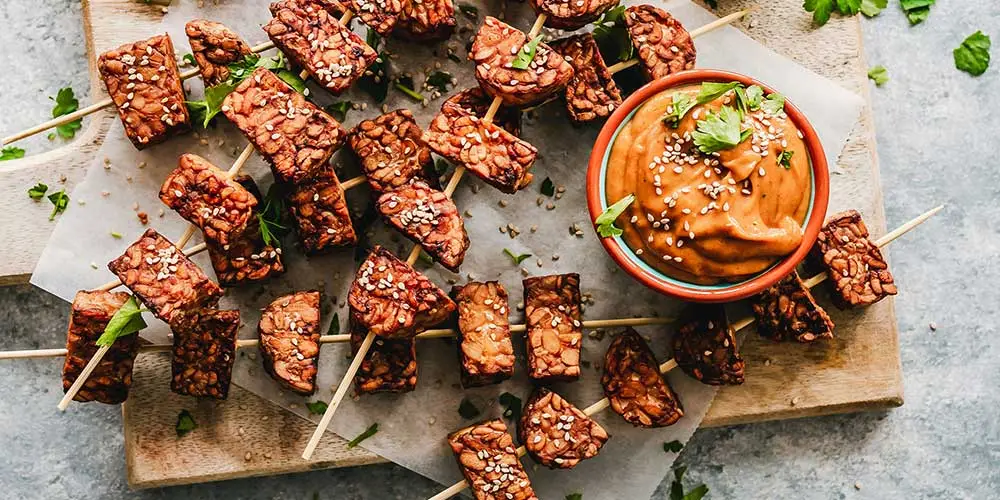
Tempeh: A Nutty Soy-Based Treat
Have you ever heard of tempeh? It’s definitely a lesser-known soy product but incredibly beneficial food for gut health. Popular among vegans, tempeh originated in Indonesia and is made from fermented soybeans and is a fantastic source of probiotics — the friendly bacteria that your gut loves.
The process of fermentation is what makes tempeh stand out for gut health. During fermentation, beneficial bacteria break down the phytic acid in soybeans, which is typically hard for your stomach to digest. This means tempeh not only contributes to a more balanced gut but also enhances the absorption of nutrients.
But the benefits don’t stop there. Full of protein, calcium and iron, tempeh supports muscle growth, bone health, and anemia prevention — a truly powerful ally for your body. And you’ll find tempeh to be impressively versatile in the kitchen. Slice it for salads, crumble it into stir-fries, or even grill it for a meaty, smoky flavor.
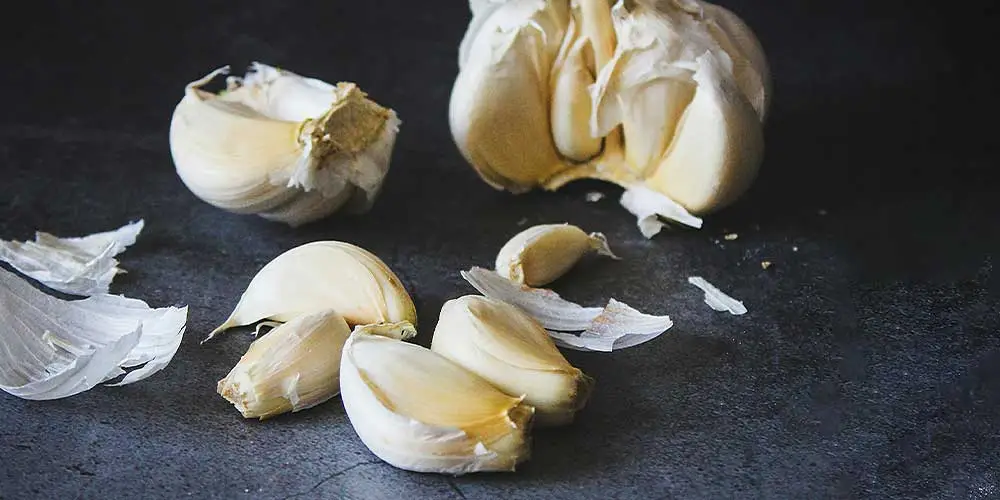
Garlic: The Flavor-Packed Prebiotic
Garlic is sort of a culinary champion, but did you know besides its punchy flavor it’s also incredibly beneficial for your gut? Yup. Garlic isn’t only about adding zest to your meals, it’s a prebiotic powerhouse. Prebiotics are types of dietary fiber that feed the good bacteria in your gut. These beneficial bacteria, in turn, assist in various critical functions like nutrient absorption and immune response.
Garlic is chock-full of these prebiotic compounds, particularly a substance known as inulin, and another called fructooligosaccharides (FOS). Both are adept at promoting healthy gut flora.
Many label garlic a superfood, which is a fitting title given its diverse benefits. Besides its prebiotic properties, garlic boasts an impressive array of contributions to wellness including antibacterial and antiviral effects, helping to combat illness and inflammation. Garlic’s positive impact on cardiovascular health by contributing to the management of blood pressure and cholesterol levels further cements its superfood status.
When it comes to incorporating garlic into your diet, possibilities abound. From raw to roasted, it can easily be added to a variety of dishes. Never underestimate a simple clove — it has the power to transform not just your meal, but also the health of your gut.
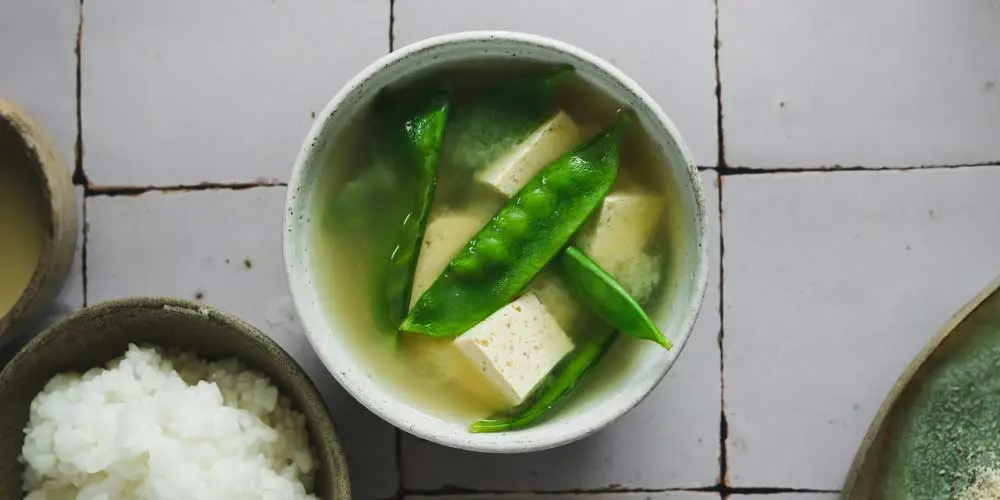
Miso: Way More Than Just a Soup Starter
You’re probably not familiar with the full benefits of miso, but there’s a reason Japanese people consume miso virtually every day. The traditional Japanese seasoning rich in probiotics certainly deserves a spot in your kitchen.
Miso is made by fermenting soybeans with salt and a fungus known as koji. This process allows beneficial bacteria to thrive, making it a potent probiotic food. Regular consumption of miso can contribute to a balanced gut microbiome, aiding digestion and immunity. It’s rich in essential minerals and possesses that delicious umami flavor sought after in Japanese cuisine.
There’s of course miso soup, but you can use this flavorful paste to marinate proteins or in dressings for salads. With its salty flavor profile, miso makes an excellent savory base for many recipes, offering a way to enhance your meals both in taste and health benefits.
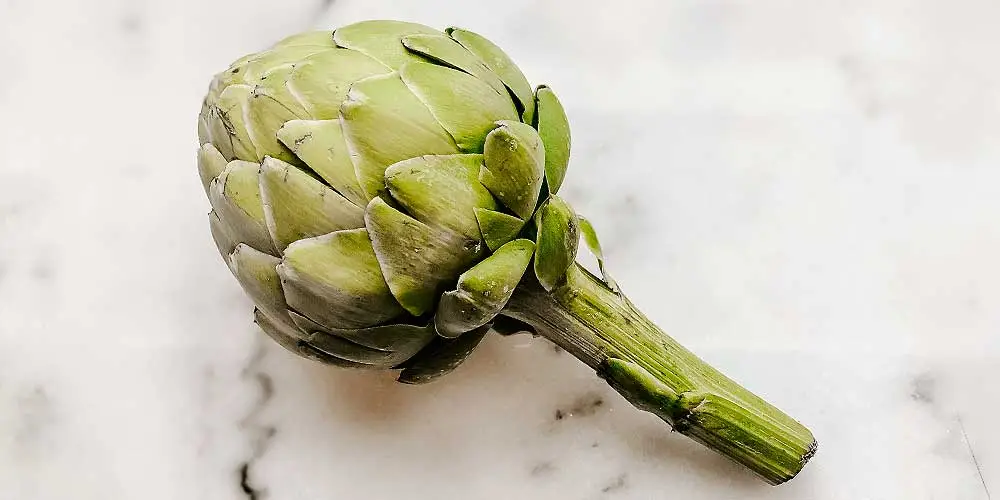
Artichokes: Inulin-Filled Fibre for Gut Flora
Artichokes don’t just grace your plate with a delightful taste, they’re potent allies for your gut health because they are rich in a substance called inulin. Inulin is a type of prebiotic fiber that does wonders for your gut flora, feeding the beneficial bacteria that reside there.
And beyond supporting a thriving microbiome, incorporating artichokes into your diet can help with nutrient absorption and may even aid in blood sugar regulation — all due to their superb prebiotic profiles.
They may look complex to prepare, but they can easily be steamed, grilled or roasted. Another option is to add canned artichoke hearts to salads, pasta dishes, or as a pizza topping for an extra boost of gut-friendly goodness.
Key Takeaways for Fostering a Flourishing Gut
You’ve now been introduced to a variety of foods that can significantly improve your gut health. From the tang of sauerkraut to the fizz of kombucha, there’s no shortage of delicious options that pack a probiotic punch.
It’s a good idea to add these foods into your diet gradually. Sudden increases in fiber or fermented foods can cause temporary digestive discomfort. Listening to your body’s responses is crucial as you find the right balance for your gut.
And remember, consistency is key. Regular consumption of gut-friendly foods, combined with a healthy eating, will keep your digestive system humming.
Your gut health journey doesn’t end here. Continue to explore and include diverse and nutrient-rich foods in your diet. The more varied your intake of foods, the more diverse your microbiome can become. And if there’s one main takeaway, it’s that your gut is your ally. Nourish it well, and it will, in turn, take good care of you. Maintain a curious palate and enjoy your path to better gut health.


Leave a Reply